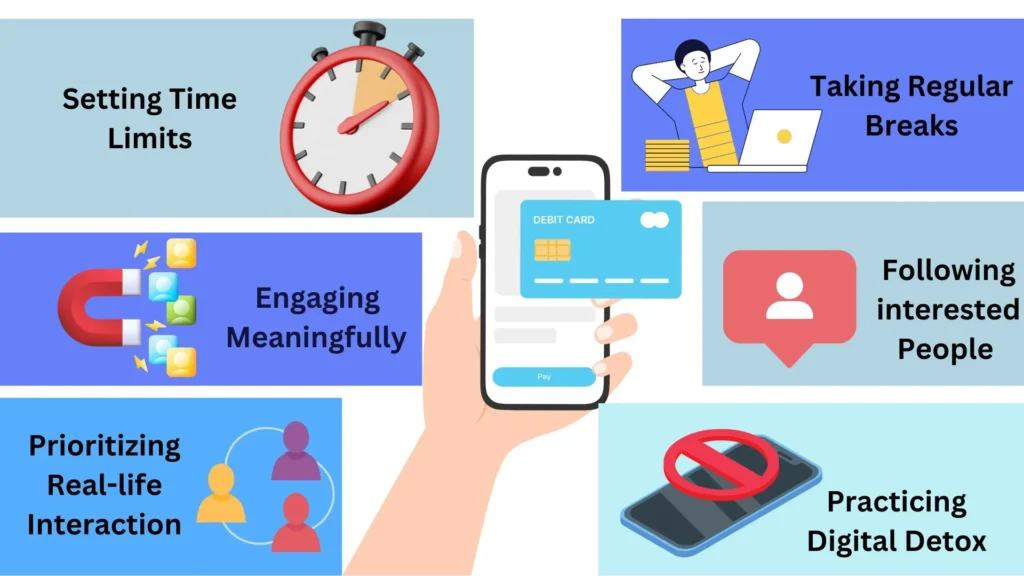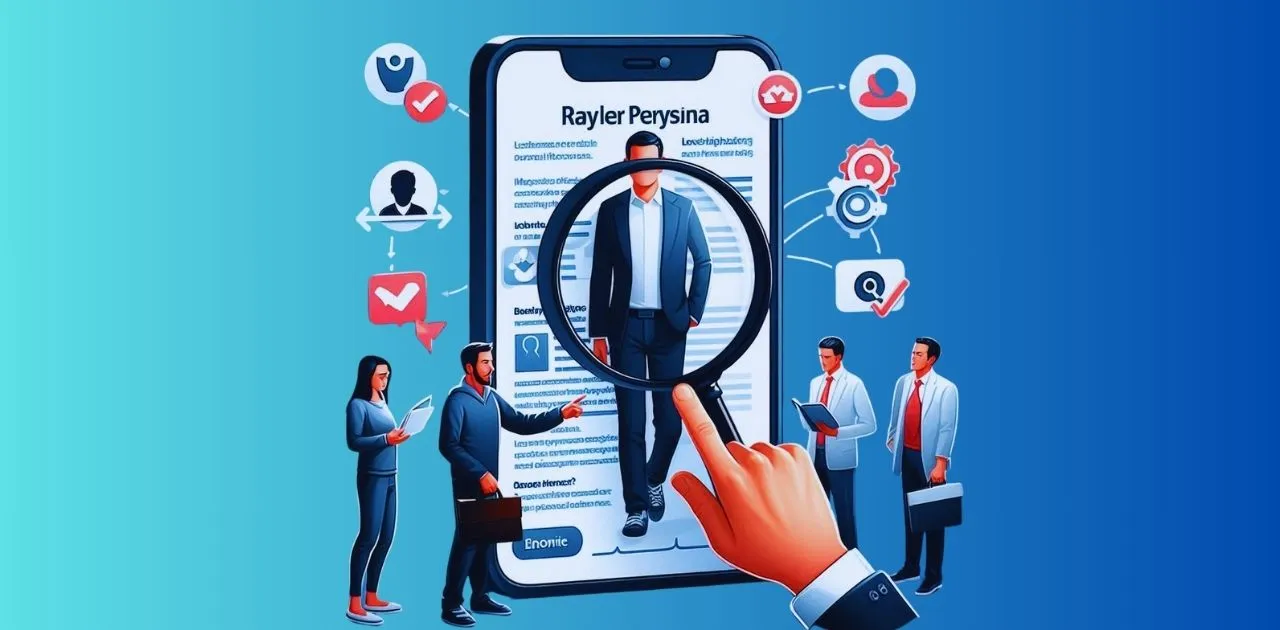In the digital age, social media has become an essential part of our everyday life. It’s where we connect, share, learn, and entertain ourselves.
However, social media can sometimes be a source of negativity, from toxic comments to distressing news. The quality of your social media experience can significantly affect your mental health and well-being.
Imagine a social media life where you feel inspired, connected, and refreshed instead of anxious or exhausted.
Adopting healthy social media habits can turn your social media experience from a stressful source into an inspiration for productivity and optimism. These habits will help you take control of your digital world.
Table of Contents
6 Healthy social media habits
Do you want to know how to use social media in a healthy way? Let’s discuss the top 6 healthy social media habits for a better life.

1. Setting Time Limits
Setting time limits on social media is a crucial habit that promotes healthy social media usage and helps you maintain a balanced and fulfilling life.
Studies in 2018 have shown that limiting social media use leads to a significant reduction in loneliness and depression.
Overuse of social media can result in a number of issues, such as
- Decreased productivity
- Disrupted sleep patterns
- Increased feelings of anxiety and depression.
Setting time limits can reduce these adverse effects and maintain a healthier relationship with your digital devices. Limiting your social media usage has various advantages, including increased focus, better sleep, greater mental health, and more real-life interaction.
How Can You Set Time Limits?
- Use built-in tools and apps like Screen Time (iOS) and Digital Well-being (android).
- Set timers and reminders
- Disable non-specific notifications
- Schedule specific social media time
- Engage in an alternative activity
For instance, check your accounts for 30 minutes in the morning and 30 minutes in the evening. This structured approach prevents endless scrolling and helps you stay focused on other tasks.
2. Engaging Meaningfully
Engaging meaningfully allows you to build genuine relationships, encouraging a sense of community and support. Meaningful interactions can boost your mood and mental health.
Engaging meaningfully on social media can significantly enhance your digital experience. This not only enriches your knowledge but also helps develop critical thinking skills.
Meaningful conversations encourage thoughtful discourse and the exchange of ideas. Positive and supportive online exchanges can reduce loneliness and isolation and provide emotional fulfillment.
As Henry David Thoreau “It’s not enough to be busy; so are the ants. The question is: What are we busy about”.
When you focus on quality interactions rather than quantity, your overall satisfaction with social media increases. Meaningful engagement can make your time online more enjoyable and rewarding.
Some tips for meaningful engagement
- Comment thoughtfully
- Share personal experiences
- Join interest-based groups
- Focus on quantity over quality
- Listen and respond respectfully
3. Prioritizing Real-life Interaction
While online interactions are convenient, real-life connections are more meaningful and one of the healthy social media habits. Prioritizing real-life interactions is fundamental to maintaining a healthy relationship with social media.
It is about maintaining a balance between your online and offline life. Healthy and happy people always prioritize real-life interaction as their important habit.
It entails setting aside time and effort to interact with individuals in person, encouraging deeper connections, and promoting overall well-being.
Nonverbal clues like body language and expressions greatly aid communication. These elements often need to be made aware of digital communication, making in-person interactions more impactful for building solid relationships.
Peter Drucker once said, “The most important thing in communication is hearing what isn’t said.”
Regular face-to-face interactions help improve your communication skills. Engaging in real conversations enables you to become a better listener, enhances your empathy, and boosts your confidence in social settings. Therefore, all healthy girls have strong social connections.
Tips for Prioritizing Real-life Interaction
- Set boundaries for your social media use.
- Plan offline activities with friends and family.
- Create tech-free zones or times.
- Use social media as a tool to facilitate real-life interactions.
4. Taking Regular Breaks
One effective way to maintain a healthy relationship with social media is by taking regular breaks. These breaks help you to recharge, refocus, and reconnect with the world around you.
As Anne Lamott says, “Almost everything will work again if you unplug it for a few minutes, including you.”
It reduces the risk of burnout, characterized by feelings of exhaustion, cynicism, and reduced productivity.
Sitting for prolonged periods while using social media can affect your physical health, leading to eye strain, neck pain, and poor posture.
Research shows short breaks throughout the day can enhance focus, creativity, and productivity. By stepping away from your screen periodically, you give your brain a chance to reset, making you more effective when you return to your tasks.
How can you Incorporate Regular Breaks?
- Use timer or reminders
- Schedule breaks at regular intervals
- Sets limits on screen time
- Establish tech-free zones
5. Follow People and Things You Enjoy
An easy way to feel optimistic on social media is by controlling what you see. Be careful about who you accept as friends and choose to follow. Even If your family member’s posts upset you, unfollow or mute them.
It is one of the healthy social media habits. By following accounts and pages that align with your interests and values, you contribute to a more positive online environment. Engaging with content that resonates with you encourages meaningful interactions and promotes a supportive community.
Orphan Winfrey says, “Surround yourself with only people who are going to lift you higher.”
Surrounding yourself with enjoyable content can uplift your mood and reduce stress. When your feed is filled with positive, inspiring, and entertaining posts, it can create a sense of joy and relaxation.
When you follow the content you enjoy, you’re more likely to engage with it actively. This leads to a more satisfying social media experience as you participate in discussions, share insights, and connect with like-minded individuals.
Tips to Follow People and Things You Enjoy
- Identify your interests and values.
- Be selective with the following.
- Explore new content
- Engage with positive content
- Curate you Feed
6. Practice Digital Detox
A digital detox involves taking a break from digital devices, particularly smartphones, computers, and social media platforms. The goal is to reduce stress, prevent burnout, and restore balance to your life by disconnecting from the online world for a period.
With the widespread use of social media, it’s easy to develop unhealthy habits such as mindless scrolling, constant notifications, and an overreliance on digital interactions. A digital detox helps break these patterns, allowing you to focus on real-life social experiences and relationships.
As the saying goes,
”Disconnect to reconnect. Sometimes you need to step away to see things clearly.”
Disconnecting from digital distractions helps improve concentration, healthy sleep habits, and mental clarity. However, the blue light of screens can disrupt sleep patterns. A digital detox, especially before bedtime, can enhance sleep quality and overall health.
How to Practice Digital Detox
- Limit notifications
- Use digital well-being tools
- Engage in offline activity
- Reflect on your Experience
- Use technology mindfully
Conclusion
Adopting healthy social media habits is essential in our digitally driven world to maintain a balanced and fulfilling life.
From setting time limits and engaging meaningfully to prioritizing real-life interactions and practicing digital detox, these strategies can significantly enhance your online experience and overall well-being.
Remember that small, consistent changes can significantly improve your mental health and productivity. Embrace these practices to create a more intentional and balanced digital life where social media serves as a tool for your growth rather than a source of stress.
FAQs
How can I deal with the pressure to post on social media constantly?
Feeling pressured to post frequently on social media is common, but it’s essential to prioritize your well-being over the expectations of others. Start by setting boundaries and reminding yourself that quality matters more than quantity. Focus on posting content that is meaningful to you rather than trying to keep up with others. Remember that taking breaks and stepping away from social media is okay when needed. Practice self-compassion and prioritize your mental health above the pressure to post constantly.
How do I create a balanced social media routine?
Creating a balanced social media routine involves setting boundaries and being mindful of your usage. Start by establishing specific times of the day for social media and sticking to them. Prioritize meaningful interactions over mindless scrolling by engaging with content that adds value to your life. Limit your screen time by avoiding screen time to focus on offline activities. Remember to prioritize self-care and listen to your body’s signals when it’s time to disconnect. If you achieve the correct balance, you may benefit from social media while maintaining a healthy lifestyle.
What are some alternatives to social media for staying connected with friends and family?
There are many ways to stay connected with friends and family outside of social media. You can make phone or video calls for more personal and engaging conversations. Text messaging and emails are also great for keeping in touch regularly. Organizing in-person gatherings, such as family dinners or outings, fosters stronger relationships. Additionally, engaging in shared activities or hobbies can create meaningful connections and memories without relying on social media.




